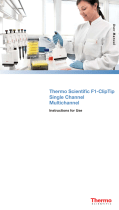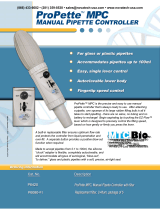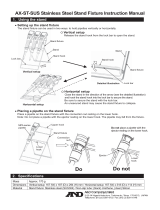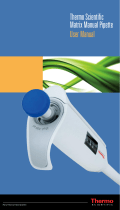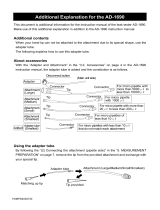Page is loading ...

User’s Guide
EN
G

INTRODUCTION
TABLE OF CONTENTS
3
2
PIPETMAN G® | INTRODUCTION
TABLE OF CONTENTS | PIPETMAN G®
Chapter 1
INTRODUCTION
PIPETMAN G® is a fully adjustable air
displacement pipette and is used with disposable
tips. To answer the current needs of the loyal
users of our pipette, and still conform to Gilson
brand qualities, three improvements have been
added to our mechanical series:
● pipetting and purge forces dramatically
decreased*,
● large volumes, 5 mL and 10 mL very
comfortable,
● choose a plastic ejector or a stainless steel
ejector.
*Implementation of new features to improve dramatically
pipetting comfort has no impact on the legendary robustness,
accuracy and precision of PIPETMAN.
Eight single channel models cover a volume
range from 0.2 µL to 10 mL.
Parts Check List
Just take a moment to verify that the following
items are present:
● PIPETMAN G,
● User’s Guide,
● Safety bag,
● Certificate of conformity
(including barcode sticker).
Decreased pipetting forces are
due to the new designed piston
assembly including the use of a
very high quality of lubricant. The
use of other lubricant cancels
the warranty of this pipette. This
lubricant is available under the
reference: 5440011070. Please
contact your Gilson distributor.
NOTICE
TABLE OF CONTENTS
INTRODUCTION | 3
Parts CheckList | 3
GLP Features | 4
Description | 5
Specifications | 6
SETTING THE VOLUME | 8
PIPETTING | 9
Fit the Tips | 9
Pre-rinse the Tips | 10
Aspirate | 10
Dispense | 11
Guidelines for Good Pipetting | 12
ACCESSORIES | 14
TROUBLESHOOTING | 15
Leak Test | 16
MAINTENANCE | 17
CLEANING AND DECONTAMINATION | 21
SPARE PARTS | 24
WARRANTY | 26

INTRODUCTION
INTRODUCTION
5
4
PIPETMAN G® | USER’S GUIDE
INTRODUCTION | PIPETMAN G®
Description
Please refer to the following chapters for a full
description of the different parts and functions of
the pipette.
PIPETMAN
DIAMOND® tip
Tip ejector
Tip holder
Color-coded
push button
Blue ring
Thumbwheel
Tip ejector button
GLP Features
The Serial Number is engraved on the body of
the pipette. It provides unique identification of
your pipette and the date of manufacture.
Ex : AA10369
The Barcode on the box and the certificate of
conformity provide traceability of your pipette.
Serial Number
Handle
Figure 2
PIPETMAN G
Figure 1
Serial Number Location
Connecting nut

INTRODUCTION
INTRODUCTION
7
6
PIPETMAN G® | USER’S GUIDE
INTRODUCTION | PIPETMAN G®
Specifications
PIPETMAN G is a high quality pipette that offers
excellent accuracy and precision. The figures given
in the Gilson Maximum Permissible Errors table
(page 7) were obtained using PIPETMAN
DIAMOND Tips. These figures are guaranteed only
when genuine PIPETMAN DIAMOND Tips are used.
Each pipette is inspected and validated by qualified
technicians in accordance with the Gilson Quality
System. Gilson declares that its manufactured
pipettes comply with the requirements of
the ISO 8655 standard, by type testing.
The adjustment is carried out under strictly
defined and monitored conditions (ISO 8655-6).
The data given in the tables conform
to the ISO 8655-2 Standard.
With a precise pipetting technique,
see Guidelines for Good Pipetting
on page 12, the P2G model may be
used to aspirate volumes as low as
0.1 µL and the P10G model as low
as 0.5 µL.
NOTICE
MAXIMUM PERMISSIBLE ERRORS
MODEL
VOLUME
(µL)
GILSON ISO 8655
SYSTEMATIC
ERROR
(µL)
RANDOM
ERROR
(µL)
SYSTEMATIC
ERROR
(µL)
RANDOM
ERROR
(µL)
P2G
(F144054P)
(F144054M)
Min. 0.2 ± 0.024 ≤0.012 ±0.08 ≤0.04
0.5
± 0.025 ≤0.012
±0.08
≤0.04
Max. 2 ± 0.030 ≤0.014 ±0.08 ≤0.04
P10G
(F144055P)
(F144055M)
Min. 1 ± 0.025 ≤0.012 ± 0.12 ≤0.08
5
± 0.075 ≤0.030
± 0.12
≤0.08
Max. 10 ± 0.100 ≤0.040 ± 0.12 ≤0.08
P20G
(F144056P)
(F144056M)
Min. 2 ± 0.10 ≤0.03 ± 0.20 ≤0.10
10 ± 0.10 ≤0.05 ± 0.20 ≤0.10
Max. 20 ± 0.20 ≤0.06 ± 0.20 ≤0.10
P100G
(F144057P)
(F144057M)
Min. 10 ± 0.35 ≤0.10 ± 0.80 ≤0.30
50 ± 0.40 ≤0.12 ± 0.80 ≤0.30
Max. 100 ± 0.80 ≤0.15 ± 0.80 ≤0.30
P200G
(F144058P)
(F144058M)
Min. 20 ± 0.50 ≤0.20 ± 1.60 ≤0.60
100 ± 0.80 ≤0.25 ± 1.60 ≤0.60
Max. 200 ± 1.60 ≤0.30 ± 1.60 ≤0.60
P1000G
(F144059P)
(F144059M)
Min. 100 ± 3 ≤0.6 ± 8 ≤3.0
500 ± 4 ≤1.0 ± 8 ≤3.0
Max. 1000 ± 8 ≤1.5 ± 8 ≤3.0
P5000G
(F144066)
Min. 500 ± 12 ≤3 ± 40 ≤15
2500 ± 15 ≤5 ± 40 ≤15
Max. 5000 ± 30 ≤8 ± 40 ≤15
P10mLG
(F144067)
Min. 1000 ± 30 ≤6 ± 60 ≤30
5000 ± 40 ≤10 ± 60 ≤30
Max. 10000 ± 60 ≤16 ± 60 ≤30
Gilson Maximum Permissible Errors
Each pipette model (except P5000G and P10 mLG)
has two different ordering references to identify the
kind of tip ejector required. For a pipette with a
plastic tip ejector, the ordering reference is ended
by the letter P, for a pipette with a stainless steel tip
ejector, the ordering reference is ended by the letter
M. Ex: For a P10G model with the plastic tip ejector
the ordering reference is F144055P. For the same
pipette with a stainless steel tip ejector, the ordering
reference is F144055P.

PIPETTING
SETTING THE VOLUME
9
8
SETTING THE VOLUME | PIPETMAN G®
Chapter 3
PIPETTING
It is recommended to use PIPETMAN® DIAMOND
Tips with the PIPETMAN G for optimum
performance. These tips are made from pure
polypropylene. Plastic tips are for a single
application—they must not be cleaned for reuse.
Fit the Tips
To fit a new PIPETMAN DIAMOND Tip, push the tip
holder into the tip using a slight twisting motion to
ensure a firm, airtight seal.
For the P2G and P10G Models Equipped with
Stainless Steel Tip Ejector,
A dual-position adapter (plastic)
is required to fit DL10 tips
(long tips) or D10 tips (short
tips).
P2G and P10G models are
delivered with the adapter
in place, ready to use
DL10 tips. If D10 tips are
used, the adapter must be
repositioned in the shorter
slot as follows:
1. Pull the adapter down
from the metallic rod.
2. Turn the adapter through
180°C.
3. Refit the adapter so that
the end of the metallic
rod engages the shorter
slot of the adapter.
Short tips
Long tips
Figure 5
Dual-Position
Adapter for P2G
and P10G with
stainless steel tip
ejector
Chapter 2
SETTING THE VOLUME
The volume of liquid to be
aspirated is set using the
volumeter. The dials are
colored either black or red to
indicate the position of the
decimal point, depending on
the model (see examples).
The volume is set by turning the thumbwheel or the
push button. The push button makes it easier and
quicker to set volumes, especially when wearing
gloves. The thumbwheel may be turned using only
one hand to slowly reach the required setting.
To obtain maximum accuracy when setting the
volume, proceed as follows:
● when decreasing
the volume setting,
slowly reach the
required setting,
making sure not to
overshoot the mark.
● when increasing the
volume setting, pass
the required value
by 1/3 of a turn and
then slowly decrease
to reach the volume,
making sure not to
overshoot the mark.
MODEL
COLOR OF VOLUMETER
NUMBERS
BLACK
RED
INCREMENT
P2G µL 0.01 µL 0.002 µL
P10G to
P20G µL 0.1 µL 0.02 µL
P100G-
P200G µL - 0.2 µL
P1000G 0.01 mL mL 0.002 mL
P5000G 0.01 mL
mL 0.002 mL
P10mLG mL 0.01 mL 0.02 mL
1
5
P2G
1.25 µL
2
0
7
5
P10G
7.5 µL
1
2
5
P20G
12.5 µL
P100G
0
7
5
75 µL
P200G
1
2
5
125 µL
P1000G
0
7
5
0.75 mL
P5000G
1
2
5
1.25 mL
P10mlG
0
7
5
7.5 mL
Push button
Thumbwheel
Figure 3
Dial Colors by Model
Figure 4
Location of
Push Button and
Thumbwheel
PIPETMAN G® | USER’S GUIDE

PIPETTING
PIPETTING
11
10
PIPETMAN G® | USER’S GUIDE
PIPETTING | PIPETMAN G®
1
2
First stop
Second
stop
Dispense
1. Place the end of the tip against the inside wall of
the recipient vessel (at an angle of 10° to 40°).
2. Press the push button slowly and smoothly
to the first stop.
3. Wait for at least a second, then press the
push button to the second stop to expel
any residual liquid from the tip. Keep the
push button pressed fully down and (while
removing the pipette) draw the tip along the
inside surface of the vessel.
4. Release the push button, smoothly. Eject the
tip by pressing firmly on the tip ejector button.
Figure 6
Pipetting Motion - Aspirate and Dispense
For the P2G and P10G Models Equipped with
Plastic Tip Ejector,
A tip ejector extension is supplied to fit
with D10 tips (short tips).
To fit a tip ejector extension:
1. Slide the extension over the tip
holder.
2. Push the extension firmly onto
the end of the tip ejector until it
clicks into place.
To remove a tip ejector extension:
1. Gently twist the extension.
2. Pull it away from the pipette.
Both dual-position adapter and tip ejector
extension are autoclavable .
Pre-rinse the Tips
Some liquids (e.g.,protein-containing solutions
and organic solvents) can leave a film of liquid
on the inside wall of the tip; pre-rinse the tip to
minimize any errors that may be related to this
phenomenon.
Pre-rinsing consists of aspirating the first volume
of liquid and then dispensing it back into the
same vessel (or to waste). Subsequent volumes
that you pipette will have levels of accuracy and
precision within specifications.
Aspirate
1. Press the push button to the first stop
(this corresponds to the set volume of
liquid).
2. Hold the pipette vertically and immerse the
tip in the liquid (see immersion depth table,
page 12). Release the push button slowly
and smoothly (to top position) to aspirate
the set volume of liquid. Wait one second
(time depends on model, see table); then
withdraw the pipette-tip from the liquid.
You may wipe any droplets away from the
outside of the tip using a medical wipe,
however if you do so take care to avoid
touching the tip’s orifice.

PIPETTING
13
PIPETMAN G® | USER’S GUIDE
PIPETTING
PIPETTING
13
12
PIPETMAN G® | USER’S GUIDE
PIPETTING | PIPETMAN G®
10. You may remove the tip ejector, see
CHAPTER 6 - MAINTENANCE to aspirate
from very narrow tubes.
11. After pipetting acids or other corrosive liquids
that emit vapors, remove the tip ejector, the tip
holder, rinse, dry and lubricate the piston, see
CHAPTER 6 - MAINTENANCE. For the model
P1000G, by using a specific tip holder equipped
with a filter, you can increase the lifetime of the
piston, see CHAPTER 4 - ACCESSORIES.
12. Do not pipette liquids having temperatures
above 70°C or below 4°C. The pipette can
be used between + 4°C and + 40°C but
the specifications may vary according to
the temperature (refer to the ISO 8655-2
standard for conditions of use).
Guidelines for Good Pipetting
1. Make sure that you operate the push button
slowly and smoothly.
2. When aspirating, keep the tip at a constant
depth below the surface of the liquid (refer to
the table).
3. Change the tip before aspirating a different
liquid, sample, or reagent.
4. Change the tip if a droplet remains at the end of
the tip from the previous pipetting operation.
5. Each new tip should be pre-rinsed with the
liquid to be pipetted.
6. Liquid should never enter the tip holder; to
prevent this:
● press and release the push button slowly
and smoothly,
● never turn the pipette upside down,
● never lay the pipette on its side when there
is liquid in the tip.
7. If you use the same tip with a higher volume,
pre-rinse the tip.
8. For volatile solvents you should saturate the
air-cushion of your pipette by aspirating and
dispensing the solvent repeatedly before
aspirating the sample.
9. When pipetting liquids with temperatures
different to the ambient temperature, pre-rinse
the tip several times before use.
TABLE - IMMERSION DEPTH AND WAIT TIME
MODEL
IMMERSION
DEPTH (MM)
WAIT TIME
(SECONDS)
P2G 1 1
P10G 1 1
P20G 2-3 1
P100G 2-4 1
P200G 2-4
1
P1000G 2-4
2-3
P5000G 3-6
4-5
P10mLG 5-7 4-5

Chapter 5
TROUBLESHOOTING
A quick inspection of the pipette may help you to
detect a problem.
The following table may help you to identify and
correct the problem you might encounter.
TROUBLESHOOTING
ACCESSORIES
15
14
PIPETMAN G® | USER’S GUIDE
ACCESSORIES | PIPETMAN G®
SYMPTOM POSSIBLE CAUSE ACTION
Pipette is leaking
sample
Damaged tip holder
Worn O-ring or seal
Replace the tip holder
Replace both parts and
lubricate
Pipette won’t aspirate
Worn O-ring
Damaged tip holder
Connecting nut is loose
Damaged or corroded piston
Improper repair or assembly
Replace both parts and lubricate
Replace the tip holder
Tighten connecting nut
Return pipette to supplier
See CHAPTER 6 - MAINTENANCE
Pipette is inaccurate
Improper repair or assembly
Unscrewed tip holder
Connecting nut is loose
See CHAPTER 6 -
MAINTENANCE
Tighten connecting nut
Tighten connecting nut
Pipette is not precise
Tip holder is loose
Connecting nut is loose
Incorrect operator technique
Damaged or corroded piston(s)
Damaged tip holder(s)
Worn O-ring or seal
Tighten connecting nut
Tighten connecting nut
Operator training
Return pipette to supplier
Replace the tip holder
Replace both parts and
lubricate
Tips fall o or
do not fit correctly
Low quality tips
Dirty tip holder
Damaged tip holder(s)
Damaged tip ejector
Ejector spacer is missing
The ejector spacer is damaged
The tip ejector is loose
The ejector lock is misaligned
Use PIPETMAN DIAMOND tips
Clean the tip holder with alcohol
Replace the tip holder
Replace tip ejector
Mount the spacer on the tip ejector
Replace the ejector spacer
Assemble the tip ejector properly
Align the ejector lock
Pipetting seize up Piston need lubricant Lubricate piston assembly
If you cannot solve the problem, contact your
local Gilson representative.
NOTE
You may download from the Gilson
website (www.gilson.com)
the “2 minute inspection poster”,
which shows how to perform a
quick diagnosis of your pipette.
Chapter 4
ACCESSORIES
To make pipetting more comfortable and
more secure, Gilson has developed several
accessories:
Pipette stands allow users to store pipettes
vertically to avoid the possibility of liquid
running back into the pipette.
DESCRIPTION P/N
CARROUSEL™ pipette stand (7 pipettes) F161401
TRIO™ stand (3 pipettes) F161405
SINGLE™ PIPETTE HOLDER F161406
To identify or personalize your pipette,
COLORIS™ clips are available:
DESCRIPTION P/N
COLORIS™ clips (mixed colors set of 10) F161301
COLORIS clips (red, set of 10) F161302
COLORIS clips (yellow, set of 10) F161303
COLORIS clips (green, set of 10) F161304
COLORIS clips (blue, set of 10) F161305
COLORIS CLIPS (WHITE, SET OF 10) F161306
With The JIMMY™, a hands-free microtube
opener, you can open both snap-cap and
screw-cap microtubes.
DESCRIPTION P/N
The Jimmy™ (set of 3) F144983
To protect the piston when pipetting corrosive
liquids, you can use a specific tip holder and
filter for the model P1000N:
DESCRIPTION P/N
CORROSION PROTECTION KIT
(TIP HOLDER + A BAG OF 10 FILTERS) F144570

MAINTENANCE
17
PIPETMAN G® | USER’S GUIDE
MAINTENANCE
TROUBLESHOOTING
16
TROUBLESHOOTING | PIPETMAN G®
Chapter 6
MAINTENANCE
Routine maintenance will help keep your pipette
in good condition, ensuring a continued high level
of performance.
Maintenance is limited to:
● Cleaning or decontamination, see CHAPTER 7 -
CLEANING AND DECONTAMINATION.
● Replacing spare parts
● Greasing the piston assembly.
PIPETMAN P2G and P10G should not be
disassembled, so you may only replace the push
button, tip ejector, dual position tip ejector and
its adapter. With these pipettes if the tip holder is
damaged, the piston may also be damaged.
After replacing any parts you should
verify the performance of your
pipette following the verification
procedure available on the Gilson
website (www.gilson.com). If the
pipette needs to be readjusted,
please contact your local Gilson
Service Center.
Changing the Tip Ejector
To remove
Push the ejection
button.
Push laterally the
tip ejector.
Slide and remove
the tip ejector.
To refit
Push the ejection
button.
Slide the tip ejector along
the tip holder.
Clip the tip ejector on the
body of the pipette.
NOTICE
1
2
3
1
2
3
1
2
3
Before returning any pipette to
your local Gilson Service Center,
ensure that it is completely
free of chemical, biological, or
radioactive contamination. Refer
to CHAPTER 7 - CLEANING AND
DECONTAMINATION. Please use
the included safety bag to return
the pipette to your local Gilson
Service Center.
CAUTION
Leak Test
This test may be performed at any time to check
that the pipette does not leak, especially after
performing a maintenance or decontamination
procedure. If a pipette fails this test, replace the
O-ring and seal. After making sure that the pipette
is correctly reassembled, repeat this test.
For the P2G to P200G Models:
1. Fit a PIPETMAN DIAMOND Tip.
2. Set the pipette to the maximum volume
given in the specifications, and pre-rinse.
3. Aspirate the set volume from a beaker of
distilled water.
4. Maintain the pipette in the vertical position
and wait for 20 seconds.
5. If a water droplet appears at the end of the
tip there is a leak.
6. If you see no droplet, re-immerse the tip
below the surface of water.
7. The water level inside the tip should remain
constant; if the level goes down there is a leak.
For the P1000G, P5000G, and P10mLG
Models:
1. Fit a PIPETMAN DIAMOND Tip.
2. Set the pipette to the maximum volume given
in the specifications.
3. Aspirate the set volume from a beaker of
distilled water.
4. Maintain the pipette in the vertical position and
wait for 20 seconds.
5. If a water droplet appears at the end of the tip,
there is a leak.

MAINTENANCE
MAINTENANCE
19
18
PIPETMAN G® | USER’S GUIDE
MAINTENANCE | PIPETMAN G®
Changing the Tip Holder – No Tools Required
1. Remove the tip ejector (see page 17).
2. Unscrew the connecting nut by turning it
counter-clockwise.
3. Carefully separate the lower and upper parts.
4. Remove the piston assembly and the seals.
5. Clean, autoclave, or replace the tip holder.
6. If necessary, lubricate lightly the piston and
its seals (see below).
7. Reassemble the pipette (refer to the figure, p 18).
8. Tighten the connecting nut (turn clockwise)
9. Refit the tip ejector (see page 17).
Servicing the Piston Assembly
You may remove the piston assembly for cleaning
purposes only. If the piston assembly is changed,
the pipette must be adjusted and calibrated in a
local Gilson Service Center. As the models P2G
and P10G contain miniaturized parts, it is best not
to disassemble these pipettes yourself.
1. Remove the tip ejector
(see page 17).
2. Unscrew the connecting
nut by turning it
counter-clockwise.
3. Carefully separate the lower
and upper parts.
4. Remove the piston assembly
and the seals.
5. Leave exposed the piston,
clean it with isopropanol or
ethanol and lubricate lightly.
For P100G, P200G, and
P1000G models, lubricate
only the useful part of the
piston and the seals.
For P5000G and P10 mLG, lubricate the
tip of the piston, disassemble the seals and
lubricate their internal part.
The piston assembly must not be
autoclaved.
NOTICE
P10G, P20G
P100G, P200G
P5000G
P10mLG
P1000G
Tip holder
Tip ejector
Stainless Steel
Plastic
Connecting nut
Color coded
push button
Piston
assembly
Blue ring
Figure 7
Piston Assembly (Disassembled)

CLEANING AND DECONTAMINATION
MAINTENANCE
21
20
PIPETMAN G® | USER’S GUIDE
MAINTENANCE | PIPETMAN G®
Chapter 7
CLEANING AND
DECONTAMINATION
PIPETMAN G is designed so that the parts
normally in contact with liquid contaminants, can
easily be cleaned and decontaminated. However,
because the models P2G and P10G contain
miniaturized parts, it is best not to disassemble
these pipettes yourself; please contact your local
Gilson Service Center.
Cleaning
The pipette must be cleaned, as described below,
before it is decontaminated. Soap solution is
recommended for cleaning PIPETMAN G.
External
1. Remove the tip ejector (see page 17).
2. Wipe the tip ejector with a soft-cloth or
lint-free tissue impregnated with soap solution.
3. Wipe the entire pipette with a soft-cloth
or lint-free tissue impregnated with soap
solution, to remove all dirty marks. If the
pipette is very dirty, a brush with soft plastic
bristles may be used.
4. Wipe the entire pipette and the tip ejector
with a soft cloth or lint-free tissue soaked
with distilled water.
5. Refit the tip ejector and allow the pipette
to dry.
You may refer to the
decontamination procedure
available on the Gilson website
(www.gilson.com). Liquid must
never enter the upper part
(handle) of any pipette.
NOTICE
The use of other lubricant cancels
the warranty of this pipette.
NOTICE
6. Reassemble the pipette (refer to figure 7,
page 18).
7. Tighten the connecting nut (turn clockwise).
8. Refit the tip ejector (see page 17).
Changing the Seals
The O-ring and seal are on the piston; they must
not be autoclaved, if worn or damaged in any
way (chemical or mechanical), they must be
replaced. As the models P2G and P10G contain
miniaturized parts, it is best not to disassemble
these pipettes yourself, please contact your
local Gilson Service Center.
The dimensions of the O-ring vary depending on
the model of pipette.
1. Remove the tip ejector (see page 17).
2. Unscrew the connecting nut by turning it
counter-clockwise.
3. Carefully separate the lower and upper parts.
4. Remove the piston assembly, O-ring and seal.
5. If necessary clean the piston and replace the
seal; lubricate them lightly. Please place them
in the correct order.
6. Reassemble the pipette (refer to the figure 7,
page 18).
7. Tighten the connecting nut (turn clockwise).
8. Refit the tip ejector (see page 17).

CLEANING AND DECONTAMINATION
CLEANING AND DECONTAMINATION
23
22
PIPETMAN NEO® | USER’S GUIDE
CLEANING AND DECONTAMINATION | PIPETMAN NEO®
Chemical Decontamination
You may choose to decontaminate your pipette
chemically, in accordance with your own
procedures. Whatever decontaminant you use,
check with the supplier of the decontaminant
that it is compatible with stainless steel and
the plastics used in the construction of the
pipette: PA (Polyamide), PBT (Polybutylene
Terephtalate), PC (Polycarbonate), PC/PBT
(Polycarbonate/ Polybutylene Terephtalate),
POM (Polyoxymethylene), or PVDF
(Polyvinylidene Fluoride).
Upper Part (handle)
1. Wipe the upper part (handle) of the
pipette with a soft-cloth or lint-free
tissue impregnated with the chosen
decontaminant.
2. Wipe the upper part of the pipette with a
soft-cloth or lint-free tissue soaked with
distilled water or sterile water.
Lower Part (volumetric module)
The following components only can be immersed
in a decontaminant solution: connecting nut, tip
ejector, tip holder.
Piston assembly and seals must be degreased
with isopropanol or ethanol before being
immersed in decontamination solution in
separate vessel.
1. Remove the tip ejector, the tip holder and
the connecting nut.
2. Immerse them in the cleaning solution.
3. Degrease the piston assembly, the seals and
immerse them in another vessel.
4. Rinse each component with distilled water.
5. Leave the parts to dry by evaporation (or wipe
with a soft cloth the tip ejector, the tip holder
and connecting nut).
6. Lubricate the piston assembly and the seals.
7. Reassemble the piston assembly, the tip holder
and the tip ejector.
Internal
The following components only can be immersed
in a cleaning solution: connecting nut, tip ejector,
tip holder, piston assembly, seal and O-ring.
1. Disassemble the pipette as described in the
CHAPTER 6 - MAINTENANCE.
2. Set aside the upper part in a clean, dry place.
3. Clean the individual components of the lower
part of the pipette using an ultrasonic bath
(20 minutes at 50°C) or with a soft-cloth and
brushes. Note that the piston assembly and
seals must be degreased with isopropanol
or ethanol before being immersed in the
ultra sonic bath. Small round brushes with
soft plastic bristles may be used to clean the
interior of the tip holder.
4. Rinse the individual components with distilled
water.
5. Leave the parts to dry by evaporation or wipe
them with a clean soft-cloth or lint-free tissue.
6. Reassemble the pipette as described in the
CHAPTER 6 - MAINTENANCE.
Autoclaving
The upper part (body) and the piston assembly
of the pipette are not autoclavable. Only the
following parts may be autoclaved: tip ejector, tip
holder and connecting nut. The O-ring and seal are
not autoclavable; they may be cleaned or replaced
with the one specified in CHAPTER 8 - SPARE
PARTS.
1. Clean the parts to be autoclaved, especially
the tip holder.
2. Put the parts in an autoclaving sack.
3. Autoclave for 20 minutes at 121°C, 0.1 MPa.
4. Check that the parts are dry before
re-assembling the pipette.
5. Set the pipette aside to stabilize at room
temperature.
6. Reassemble the pipette as described in the
CHAPTER 6 - MAINTENANCE.

SPARE PARTS
SPARE PARTS
25
24
PIPETMAN G® | USER’S GUIDE
SPARE PARTS | PIPETMAN G®
Chapter 8
SPARE PARTS
Service Kit 1
st
level includes:
● 3 piston seals or
seal guides
● 3 O-rings
● 1 tip holder
Service Kit 2
nd
level includes:
● 1 push button
● 1 connecting nut
● 2 tip ejectors
for the P2G and P10G
models only:
● 1 adapter for stainless
steel tip ejector
● 1 extension for plastic
tip ejector
A
A
B
B
C
C
D
D
E
E
F1
F2
F1
F2
F3
F4
F2
F1
F3
F3
P2G (F144054P OR M) AND P10G (F144055P OR M)*
DESCRIPTION
P/N FOR
P2G
P/N FOR
P10G
C+D+E Service Kit 1
st
level F144501 FA07001
A+B+F1 to F4 Service Kit 2
nd
level F1619702 F1619712
C+D Seal + O-ring (5 sets) F144861 FA07012
F3 Tip ejector adapter F144879 F144879
F4 Tip ejector extension F2070903
F2070903
P20G (F144056P OR M) AND P100G (F144057P OR M)*
DESCRIPTION
P/N FOR
P20G
P/N FOR
P100G
C+D+E Service Kit 1
st
level FA07002 FA07003
A+B+F Service Kit 2
nd
level F1619722 F1619732
C+D Seal + O-ring (5 sets) FA07013 FA07014
P200G (F144058P OR M) AND P1000G (F144059P OR M)*
DESCRIPTION
P/N FOR
P200G
P/N FOR
P1000G
C+D+E Service Kit 1
st
level FA07004 FA07005
A+B+F Service Kit 2
nd
level F1619742 F1619752
C+D Seal + O-ring (5 sets) FA07015 FA07016
P5000G (F144066) AND P10MLG (F144067)*
DESCRIPTION
P/N FOR
P5000G
P/N FOR
P10MLG
C+D+E Service Kit 1
st
level FA07021 FA07022
A Service Kit 2
nd
level FA07019 FA07020
C+D Seal + O-ring (5 sets) FA07017 FA07018
E Tip holder F123608 F161263
Each pipette model (except P5000G and
P10mLG) has two different ordering references
to identify the kind of tip ejector required. For
a pipette with a plastic tip ejector, the ordering
reference is ended by the letter P, for a pipette
with a stainless steel tip ejector, the ordering
reference is ended by the letter M. Ex: For a P10G
model with the plastic tip ejector the ordering
reference is F144055P. For the same pipette with
a stainless steel tip ejector, the ordering reference
is F144055M.
DESCRIPTION PART NUMBER
Lubricant* 5440011070
Figure 8
Spare Parts Identified

NOTES
WARRANTY
27
26
PIPETMAN G® | USER’S GUIDE
WARRANTY | PIPETMAN G®
Chapter 9
WARRANTY
Gilson warrants this pipette against defects
in material under normal use and service for a
period of 12 months from the date of purchase.
This warranty shall not apply to pipettes which
are subject to abnormal use and/or improper
or inadequate maintenance (contrary to the
recommendations given in the User’s Guide),
including, but not limited to pipettes which
have been subjected to physical damage,
improper handling, or spillage or exposure to
any corrosive environment. This warranty shall
also be void in the event pipettes are altered
or modified by any party other than Gilson or
its designates. Gilson’s sole liability under this
warranty shall be limited to, at Gilson’s sole
option, repair or replacement of any defective
components of pipettes or refund of the
purchase price paid for such pipettes.
THE FOREGOING WARRANTY IS EXCLUSIVE
AND GILSON HEREBY DISCLAIMS ALL OTHER
WARRANTIES, WHETHER EXPRESS OR
IMPLIED, INCLUDING ANY WARRANTIES OF
MERCHANTABILITY AND ANY WARRANTIES OF
FITNESS FOR A PARTICULAR PURPOSE, UNDER
NO CIRCUMSTANCES SHALL GILSON BE LIABLE
FOR ANY CONSEQUENTIAL, PUNITIVE, INDIRECT
OR INCIDENTAL DAMAGES ARISING OUT OF
ANY BREACH OF ANY EXPRESS OR IMPLIED
WARRANTY.
NOTES

www.gilson.com/contactus
Gilson,Inc.
3000 Parmenter Street • PO Box 620027
Middleton, WI 53562 USA
T: 608-836-1551 or 800-445-7661 • F 608-831-4451
GilsonS.A.S.
19, avenue des Entrepreneurs BP 145 • F-95400
Villiers-le-Bel, France
T +33 (0) 1 34 29 50 00 • F +33 (0) 1 34 29 50 20
LT801122/C | ©2017 Gilson, Inc. All rights reserved.
/
